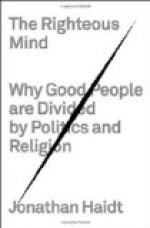|
This section contains 430 words (approx. 2 pages at 400 words per page) |

|
Chapter Six: Taste Buds of the Righteous Mind Summary and Analysis
Pluralists like Haidt and Shweder do not believe that morality can be reduced to one single principle and that such an approach leads to an unsatisfactory culture. We all have five senses but we like different foods and listen to different music. It's the same for moral reasoning. We process our experiences in different ways and reach different conclusions. In modern times, secularists see Enlightenment as the battle between science (reason) and religion (superstition). Hume believed that philosophers who attempted to reason their way to morality while ignoring the importance of human nature were on a fool's errand. Hume believed that intuition or sentiment was the driving force of morality versus reasoning which was biased and subservient to passion. He felt human sentiment was not one-dimensional but...
(read more from the Chapter Six: Taste Buds of the Righteous Mind Summary)
|
This section contains 430 words (approx. 2 pages at 400 words per page) |

|




